| Srl | Item |
| 1 |
ID:
153286
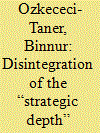

|
|
|
|
|
| Summary/Abstract |
By way of tracing a number of important developments in the last decade, this paper examines Turkey’s foreign policy under the leadership of the Justice and Development Party, with specific emphasis on the “strategic depth” doctrine. More specifically, after providing a very brief overview of Turkey’s foreign policy orientation between 1923 and 2002, the paper first discusses the basic principles of the “strategic depth” doctrine and then analyzes how three main issues – Islamization of Turkish foreign policy, the Arab Spring, and the increasing discrepancy between Turkey’s domestic politics and the image Turkey’s leaders wanted to present to the outside world – led to the disintegration of this doctrine.
|
|
|
|
|
|
|
|
|
|
|
|
|
|
|
|
| 2 |
ID:
153283
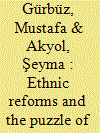

|
|
|
|
|
| Summary/Abstract |
Will pro-Kurdish reforms decrease ethnic violence in Turkey? Conventional wisdom would suggest that elimination of the root causes will heal past wounds. In bitter ethno-political conflicts, however, the issue becomes much larger than its components: deep mistrust between parties overshadow specific issue reforms. Turkey’s Kurdish issue is a case in point where ethnic reforms would not bring stability unless they are coupled with steps to eliminate mistrust. This article pays a specific attention to public framing of reforms. We argue that the actual content of reforms is not so significant; what really matters, instead, is the public perception of reforms on both sides, Turkish and Kurdish. The AKP’s claim of “democratic opening” loses credibility in recent years as the PKK’s alternative narrative gains prominence.
|
|
|
|
|
|
|
|
|
|
|
|
|
|
|
|
| 3 |
ID:
153282
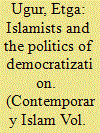

|
|
|
|
|
| Summary/Abstract |
This article offers a regime transition perspective on the complex relationship between Islamism and democratization in Turkey. By using Dankwart Rustow’s four-stage model of democratization, the article traces Islamist strategies of survival, nonconfrontation, offense, and hegemony back to the background condition of national unity, conflict of interest during the preparatory phase, and the requirements of the decision phase to complete a democratic transition. The evidence from Turkey demonstrates that democratization is not a linear process and Islamic actors may use politics of reform to ensure their survival, access to power, and domination.
|
|
|
|
|
|
|
|
|
|
|
|
|
|
|
|
| 4 |
ID:
153280


|
|
|
| 5 |
ID:
153284


|
|
|
|
|
| Summary/Abstract |
Turkey presents a prime example of a country where economic crises/successes develop simultaneously with political and social crises/successes. The current governing political party, Justice and Development Party (JDP) had its share of a period with progress in political and social inclusiveness and reforms, and the economic and political successes that come with it. Although it lost its ability to rule alone temporarily as a result of June 2015 elections, subsequently it regained power with unprecedented proportions in the history of the Republic of Turkey. Unfortunately - and very much similarly to its predecessors in the Turkish political history- JDP has lately been showing signs of authoritarianism and exclusiveness domestically, as well as isolationism internationally. These factors are leading to the end of its political life as they bring the era of economic growth and prosperity to an end with them. This paper is trying to establish links with political/social and economic success in the context of Turkish politics and management of the Turkish economy, as well as to observe and to document those links within the experience of JDP.
|
|
|
|
|
|
|
|
|
|
|
|
|
|
|
|
| 6 |
ID:
153281
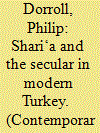

|
|
|
|
|
| Summary/Abstract |
This article discusses the paradoxical relationship of Kemalist state power and traditional Muslim theologians at the beginning of the Turkish Republic. By analyzing the history of a now-commonly accepted argument for change with the Shari‘a, this article proposes that the anxious relationship between state Kemalism and Muslim modernist theologians helped to lay the foundations of mainstream Muslim praxis in modern Turkey. I argue that the supposed conflict between “religious” and “secular(ist)” ideas in Turkey may be better described as a debate over the definition of secularity itself. A concept of the secular is implied in both Kemalist political secularism and Islamic modernism, and these two interact in ways that contribute to each other’s formation. This article will also bring contemporary theorizing on the nature of the “secular” to bear on this question in order to open up new possibilities for the study of Islam in contemporary Turkey.
|
|
|
|
|
|
|
|
|
|
|
|
|
|
|
|
| 7 |
ID:
153285
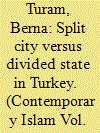

|
|
|
|
|
| Summary/Abstract |
The main goal of this article is to scrutinize and analyze two new formations of political opposition to the increasingly authoritarian pro-Islamic Justice and Development Party (Adalet ve Kalkınma Partisi, AKP) government; from within urban space and from within the branches of the state. This article investigates the context, varying agendas and future implications of these two relatively new formations of opposition, both of which have been severely attacked by the increasingly authoritarian AKP.
|
|
|
|
|
|
|
|
|
|
|
|
|
|
|
|
| 8 |
ID:
153279
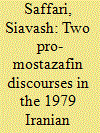

|
|
|
|
|
| Summary/Abstract |
A number of studies have examined the role of the economically marginalized classes in the 1979 Iranian Revolution and the events which transpired in its immediate aftermath. It has been suggested that the mass mobilization of these classes, often referred to collectively as the mostazafin (downtrodden) in the official literature of the Islamic Republic, was instrumental in the success of the revolution and the subsequent establishment of the Islamic Republic under the leadership of Ruhollah Khomeini. The present paper contrasts Shi’i liberation theology and Shi’i Islamism as two distinct pro-mostazafin discourses that emerged in mid- and late-twentieth century Iran, and which facilitated the participation of the lower- and under-classes in the revolutionary movement. It argues that while it was developed originally by Shi’i liberation theologians, Islamist forces were able to successfully appropriate the pro-mostazafin discourse and gain the support of the economically marginalized classes in the crucial final phase of the revolution, and in doing so create an important social base for their political power.
|
|
|
|
|
|
|
|
|
|
|
|
|
|
|
|